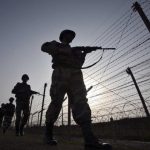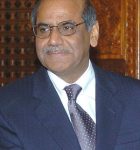Second Opinion
Line of Control: War of Words
Date: November 1, 2013

The month of January saw new tensions between Indian and Pakistan across the Line of Control, where a ceasefire had been in effect since 2003. The episode led to a diplomatic crisis and raised questions about the fragility of the bilateral dialogue once again. The LoC tensions were preceded by 22 months of favourable relations between India and Pakistan, which resulted in improved trade and visa regime policies. The episode inflamed public opinion on both sides and the dialogue process has ground to a halt.
In this backdrop, Jinnah Institute asked eminent opinion leaders from India and Pakistan their view of the situation and the steps needed to prevent the conflict from escalating. The opinions below present a stark debate that is still evolving.

Nasim Zehra, Director Current Affairs Dunya TV stated that while the latest LoC tensions spiraled into a high profile confrontation involving no less the Indian Prime Minister and the Indian army chief, Pakistan’s considered response did help to calm matters down. After a belated complaint about the Pakistan army “beheading” an Indian soldier and ratcheting up a war of words, thinking heads in Delhi proactively managed the situation by opening informal channels of communication. “˜Choreographed steps’ were taken and India responded positively to Pakistan’s statement on the need to deal with the issue through a government to government dialogue.
With no substantive progress on the Kashmir issue and with the forces of the two countries facing each other along the LoC, the political level bilateral engagement will remain “susceptible to the whims of men in uniform”. “Past the LoC confrontation, bilateral relations are fortunately back on track”, Ms. Zehra said, adding that there is robustness to the dialogue process which prevents its collapse even against a high voltage confrontation of the kind recently experienced. At the same time, she recommended that an SOP for handling military flare-ups along the LoC be established urgently. Additional factors that saved the situation include Pakistan’s widely acknowledged measured response, questions from within the Indian media and the non-formal channel of communication. She pointed out the next round of Pakistan-India Composite Dialogue will take place within 2 – 3 months, followed by meetings of the two Foreign Ministers, during which progress on MFN and elimination of the negative list will take place.

Shyam Saran, former Foreign Secretary of India observed that LoC violations have taken place in the past and there is an agreed mechanism in place to deal with them. The more serious impact on the Indian side this time was because of the “brutal and inhumane manner” in which a dead Indian soldier was treated by Pakistani forces. He stated that this has allegedly happened before on either side and if so, there is an urgent need for the two armies to establish and observe a code of conduct that conforms to the highest standards of civilised behaviour which both sides can be proud of.
According to Mr. Saran, there is a need for greater communication between the two military forces, including communication at senior levels. He believes that tensions can be contained and diminished if there are frequent and regular military to military CBMs. He recalled that India had proposed regular exchanges between the two National Defence and Staff Colleges, reciprocal visits by military sports teams and military bands but this did not elicit a positive response from Pakistan. He recommended that both Indian and Pakistani militaries should institute regular flag meetings at several points at the international border and LoC on the pattern of India-China border meetings.
“Despite occasional problems, the bilateral relations between India and Pakistan are expected to gain momentum in the coming months”, hoped Mr. Saran. In his view, the delayed grant of MFN status to India will open the door to much greater level of mutually beneficial commercial exchanges. “It is also our earnest hope that those implicated in the Mumbai terrorist outrage will be brought to book. That is one action on the part of Pakistan which would contribute the most to enhancing Pakistani credibility in India,” he said.

Major General (retd) Mahmud Ali Durrani stated that the the LoC violations could be seen as a “step backwards” for bilateral relations, given the negative impact they have created, especially in India. He felt that the episode added to the existing mistrust between the two countries. “Such incidents attract over exposure in the media and are blown out of proportion. Part of the India media and the political hawks became hysterical. Unfortunately, the truth about who initiated the crisis is lost in the noise”¦this was a local bush fire and not part of a sinister design at the highest level. I am glad Pakistan’s response was measured”, he said.
Gen. Durrani recommended a number of key steps that will help avoid such incidents in future, including pulling back troops from both sides of the LoC to a “respectable distance” that prevents a daily eyeball to eyeball confrontation. In addition, building trust by regular communication between local commanders at the battalion level, and establishing field telephone connections between opposing brigade commanders should help the situation. “Naturally the best solution is the peaceful resolution of the Kashmir issue at the earliest,” he concluded.

Vice Admiral (retd) Vijay Shankar said that the increase in armed LoC violations from 60 in 2011 to 117 in 2012 (Indian Army records) would suggest not just a growth in the incidents of violence, but also imply a surge in attempts to infiltrate terrorists into the Kashmir valley. “This is never a good sign, particularly when the Indo-Pak power differential is widening rapidly and there is growing intolerance in Delhi to the use of jihadists and non-state actors to further, what the Pakistan military calls, its strategic interests”, he said.
Mr. Shankar pointed out that the Pakistan State is critically dependant on the military and, more dangerously, that all institutions are organised so as to create conditions favourable for its hold over the nation. The domination of the military and its various organs (most notably the ISI) in political affairs, has created “an Army with a State”. “The (Pakistan) military “¦has led Pakistan to dangerous distraction”¦ Kargil, terror assault on Mumbai and the continued promotion of Hafiz Saeed and his ilk; lowering of the nuclear threshold through induction of tactical nuclear weapons and the obdurate military focus on India (despite lip service to the contrary) rather than the turmoil within, are all cases in point,” he said. He emphasised that only political and social transformation can tone down nationalist discontent, religious fanaticism and the militaristic approach to mutual relations. Both India and Pakistan must recognise this reality and work towards it if tensions are to be contained, he said.
Mr. Shankar recommended that while the Composite Dialogue must continue, the two nations should graduate from CBMs to the resolution of contentious issues. In his opinion, India has to cope with a fundamental dilemma when confronted by a “˜Janus-faced’ polity: “on the one hand is the voiceless majority of Pakistan that seeks developmental opportunities in the emerging globalised scenario, as represented by the enfeebled political leadership; while on the other is the military strategy that keeps alive, feeds and stimulates the belief that force, deception and the use of non-state actors is the best, if not the only solution to Indo-Pak differences,” he said. He pointed out that unless the political face is able to control military machinations and bring about the much needed transformation, there is little expectation for anything but cosmetic change in relations.
This material does not reflect the views of the Jinnah Institute, its Board of Directors, Board of Advisors or management. This material may not be copied, reproduced or transmitted in whole or in part without attribution to the Jinnah Institute (JI). Unless noted otherwise, all material is property of the Institute.
Copyright © Jinnah Institute 2013
